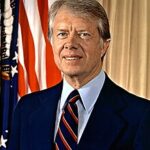President Jimmy Carter’s response to the Soviet invasion of Afghanistan in December 1979 marked a pivotal moment in Cold War diplomacy. The Carter Soviet Grain Embargo and Olympic boycott represented America’s attempt to punish Moscow without military confrontation.
The Carter Soviet Grain Embargo Decision
Carter announced the grain embargo on January 4, 1980, targeting 17 million tons of grain exports to the USSR. The embargo aimed to restrict Soviet access to American agricultural products. Carter simultaneously called for a boycott of the 1980 Moscow Olympics. These measures sought to impose economic and symbolic costs on Soviet aggression. 📊 The embargo affected $2.6 billion worth of agricultural trade annually.
Why the Embargo Strategy Failed
The Soviet Union quickly found alternative grain suppliers in Argentina and other nations. American farmers bore the immediate economic burden while Soviet food security remained intact. ⚠️ The embargo’s timing coincided with Carter’s reelection campaign, creating domestic political pressure. Critics argued the measures were symbolic gestures that harmed American interests more than Soviet ones. 💰 Farm income dropped significantly in key agricultural states during the embargo period.
Impact:
The Carter Soviet Grain Embargo produced far-reaching consequences that extended well beyond its intended effects on Soviet behavior. The policy’s failure highlighted the limitations of economic sanctions in Cold War geopolitics.
Economic Consequences of the Embargo
American farmers suffered immediate financial losses from the cancelled Soviet contracts. 📉 Grain prices plummeted as surplus supplies flooded domestic markets. The embargo cost an estimated $3 billion in lost agricultural revenue. Rural communities in the Midwest faced severe economic hardship. Agricultural cooperatives struggled to find alternative markets for their surplus grain.
Political Fallout and Electoral Impact
The embargo became a major liability in Carter’s 1980 reelection campaign. 🔥 Republican challenger Ronald Reagan promised to lift the embargo immediately upon taking office. Farm states that traditionally supported Democrats shifted toward Reagan. Carter’s approval ratings dropped significantly in agricultural regions. The policy reinforced perceptions of Carter as weak on foreign policy.
International Diplomatic Effects
The Olympic boycott divided the Western alliance over appropriate responses to Soviet aggression. 🌍 Many allied nations refused to join the boycott, undermining its effectiveness. The Soviet Union remained in Afghanistan for nine more years despite the sanctions. Alternative grain suppliers emerged, permanently reducing American market share in global agriculture.
